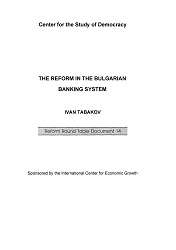The Reform in the Bulgarian Banking System
The Reform in the Bulgarian Banking System
Author(s): Ivan Tabakov
Subject(s): Politics / Political Sciences, Politics, Social Sciences, Economy, Law, Constitution, Jurisprudence, National Economy, Economic policy, Law on Economics, Socio-Economic Research
Published by: Център за изследване на демокрацията
Summary/Abstract: The economic reforms that were launched in Bulgaria following the democratic changes in late 1989 are meant to carry out the transition from a centrally planned, to market oriented economy. The banking reform is one of the chief preconditions for the organization of a financial system that conforms with market economy principles, which can facilitate the overcoming of the crisis and restoration of macroeconomic stability. The process of institutionalization of the banking system in the country was supposed, within a relatively short period of time, to settle several critical groups of questions. Most notably these were: to lay the foundations of the money and foreign exchange market; to secure stability and trust in the financial institutions; to encourage competition between them. The highlight of the reform of the financial and credit system was the transformation of the Bulgarian National Bank from an instrument of centralized planned management and a banking monopoly, into a central banking institution in a position, through its independent monetary policy, to guarantee the stability of the national currency and the viability of the banking system in Bulgaria.
Series: CSD Economy Papers
- Page Count: 12
- Publication Year: 1994
- Language: English
- Content File-PDF
- Introduction

